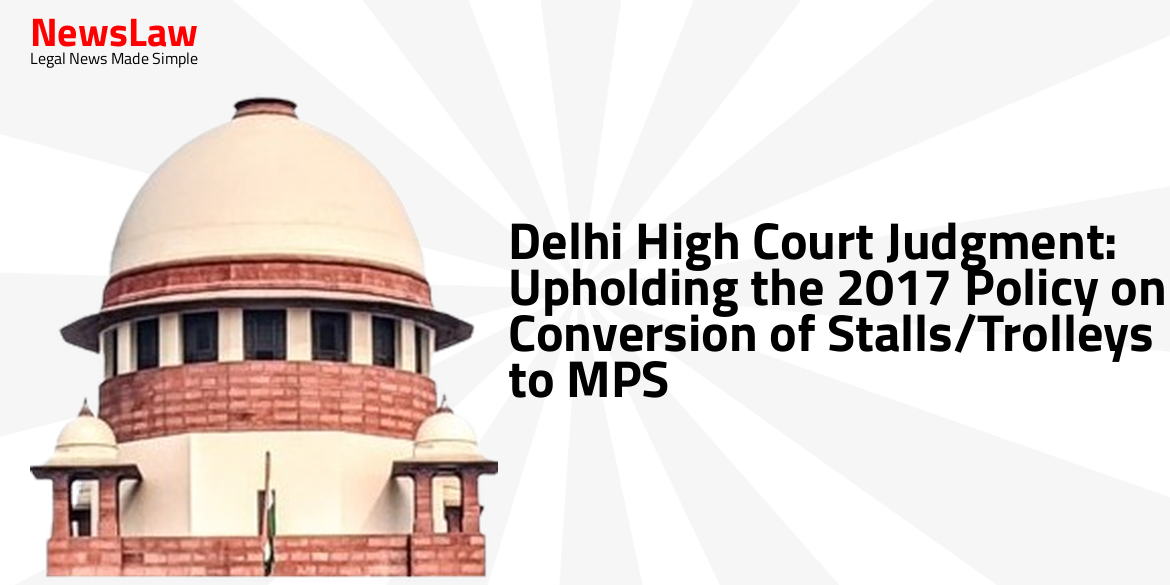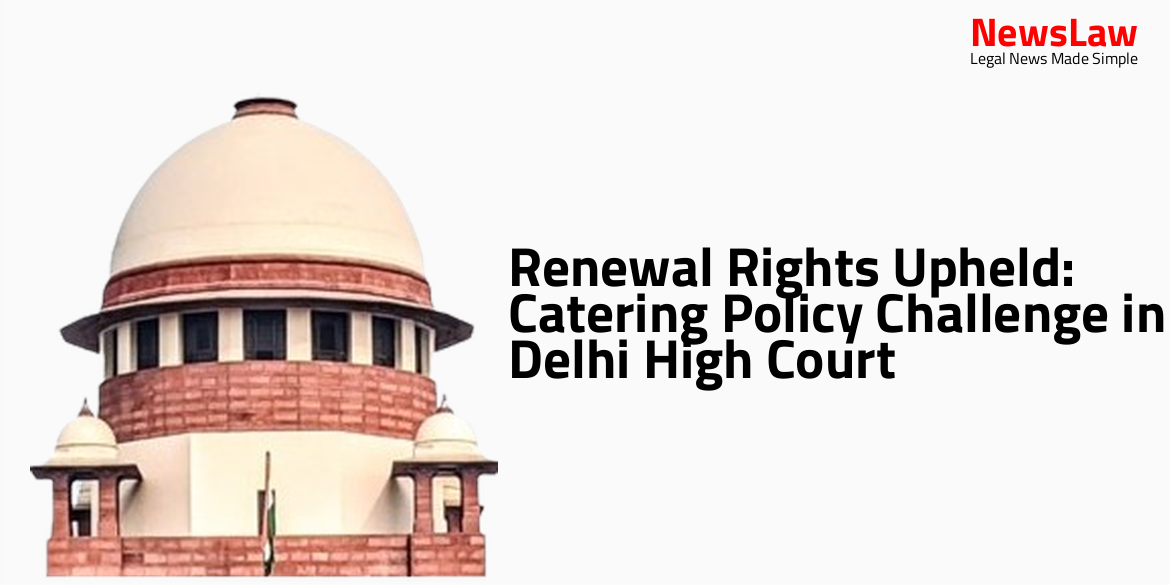In a significant ruling by the Delhi High Court, the judgment on the conversion of Stalls/Trolleys to MPS under the 2017 Policy has been upheld. The court’s decision impacts the rights and obligations of stakeholders involved, including the petitioners who were seeking renewal or extension beyond the agreed tenure. This case sheds light on the regulatory framework governing such conversions and emphasizes the importance of adhering to established policies for fair and equitable practices.
Facts
- The petitioners had to convert their stalls/trolleys to MPS in 2017 due to the 2017 Policy enforced by Northern Railway.
- Master License Agreements were executed between the petitioners and Northern Railway, each with a specific tenure.
- For example, Petitioner no.1 had a license agreement until 21.12.2022 with no provision for extension or renewal.
- In December 2022, due to Covid-19 lockdown, the tenure was extended by 68 days until 27.02.2023.
- The Petitioners were directed to vacate their MPS by the extended date of 27.02.2023 as per letters from Northern Railway.
- Petitioner no.1 operates three MPS at Bareilly Railway Station, Petitioner no.2 has one MPS at Moradabad Railway Station, and Petitioner no.3 has one MPS at Haridwar Railway Station.
Arguments
- The petitioners argue that their licenses have expired by efflux of time and they have no right to compel the respondents to extend the license.
- They claim that the 2017 Policy is legally sound and non-arbitrary, applicable universally to stall/trolley owners without discriminatory treatment towards them.
- The petitioners point out that a similar challenge against the 2017 Policy was dismissed by the Karnataka High Court in a previous judgment.
- They argue that the 2017 Policy clearly states no renewal or extension of licenses, and as the petitioners availed benefits under this policy, they cannot challenge it now.
- The petitioners claim that paragraph 1744 of the Indian Railways Commercial Manual is the root cause for the challenges they are facing.
- They argue that they should continue to be governed by past practices prior to the 2017 Policy.
- The petitioners assert that Clause 5 of the 2017 Policy violates Article 14, Article 19(1)(g), and Article 21 of the Constitution.
- They claim that they have a legitimate expectation to renew their licenses perpetually based on past practices.
- The petitioners contend that the refusal to renew their licenses while renewing others’ licenses is arbitrary and violates their fundamental rights.
- They argue that the extension of their contract due to Covid-19 was arbitrary compared to other units.
- The petitioners claim that the conversion of their stalls to MPS units was done under coercion and economic duress.
- They argue that the court has jurisdiction to decide these petitions and reject the exclusive jurisdiction clause in the agreements.
- The petitioners emphasize that the 2017 Policy prevents monopolization of licenses and provides equal opportunity for livelihood to similarly situated individuals.
- The petitioner signed a contract for five years which was non-renewable.
- The petitioner cannot claim ignorance as the terms of the contract were clearly stated in the letter of award.
- The petitioner enjoyed the benefits of the contract for the entire duration of five years.
- The petitioner’s attempt to revert to a policy no longer in existence or applicable to them is not valid.
- The Supreme Court judgment cited by the petitioner pertained to Catering Policy, not the Multipurpose Stall Policy under which the petitioner’s contract fell.
- The petitioner cannot seek to benefit from a policy that does not apply to their specific contract.
Analysis
- The contention of the petitioners that they were compelled to convert their stalls/trolleys to MPS is untenable.
- The licenses held by the petitioners are subject to the terms and conditions outlined in the 2017 Policy.
- The petitioners have benefited from the 2017 Policy/Master License Agreement but do not have a right to seek renewal or extension beyond the agreed tenure.
- The petitioners cannot claim a vested right entitling them to perpetual renewal of the license granted to them.
- Granting a license in perpetuity (as sought by petitioners) would be against the equality of opportunity guaranteed under the Constitution.
- The Supreme Court’s judgment on license renewals under the 2010 Catering Policy cannot be mechanically applied to the present case as the contexts differ.
- The court lacks the jurisdiction to mandate the renewal of a license against the 2017 Policy’s non-renewable clause.
- The 2017 Policy explicitly renders the license non-renewable, and petitioners are at liberty to participate in fresh tenders.
- The challenge to Clauses 5 and 11 of the 2017 Policy is deemed unsustainable as they adhere to the agreed terms and conditions.
- The petitioners’ reliance on a larger extension of tenure is deemed misplaced as the policy does not provide for perpetual renewals or extensions.
- The specific part of the judgment referred to as STA
- Extract from the judgment provided is point 55
- Original names used instead of generic titles like Respondent No 1 or Petitioner No 1
- Merely because relaxation was granted in the past due to changes in examination pattern/syllabus, petitioners cannot claim the same as a right.
- A writ of Mandamus cannot be used to direct the enactment of laws or framing of rules.
- Mandamus is for enforcing fundamental or statutory rights, not for policy-making.
- The court cannot delve into detailed factual situations to exercise appellate jurisdiction.
- Courts can declare laws as unconstitutional.
- Judicial review of a policy decision differs from issuing a mandamus to frame policy in a specific manner.
- A legitimate expectation does not always guarantee relief, as public interest or policy changes may outweigh it.
- No public body has arbitrary powers to decline license renewals without rational reasons.
- Individual license agreement and the 2017 Policy contain an arbitration clause for aggrieved petitioners due to insufficiency of extension on account of the Covid-19 situation.
- Petitioners can claim damages and invoke the arbitration clause to initiate appropriate proceedings.
- The arbitration clause applies to licensees who have not yet formally executed the license agreement.
Decision
- Existing Bookstall/table (other than philanthropic), Misc. Stalls/trolleys, Chemist Stalls/corner etc. may opt for conversion into MPS or continue till expiry of existing agreement/arrangement.
- Option given to convert existing stalls/trolleys into MPS subject to payment of License Fee equivalent to prospective bidder’s fee for a similarly placed MPS unit.
- Space standardized, identified, and allotted by Zonal Railways for new MPS after expiry of current agreement period.
- No new allotment, renewal, or extension of existing Bookstall/table, Misc. Stalls/trolley, Chemist Stalls/corner etc. by Railways.
- Existing stalls/trolleys allowed for conversion into MPS as per policy; tenure of 5 years from conversion.
- Conversion option exercise to be completed by Division within 90 days from policy issue date.
- MPS policy applicable immediately, supersedes previous policies.
- Petitioners given option to convert stalls/trolleys to MPS with a tenure of 5 years from conversion or continue existing arrangement till expiry.
- Petitioners granted 3 months from extended license period or judgment date to vacate stalls if opting for conversion.
- Renewal of License addressed in the context of conversion to MPS.
- Petitioners in W.P.(C) 2501/2023 seeking conversion of miscellaneous stalls/trolleys to MPS.
- No merit found in present petitions; dismissed with rights and remedies open.
- Adjudication entertained due to common issues arising for consideration.
- Present petitions deemed maintainable and adjudicated on merits.
Case Title: M. ZIYAUDDIN Vs. UNION OF INDIA AND ORS. (2024:DHC:4452)
Case Number: W.P.(C)-13614/2023



